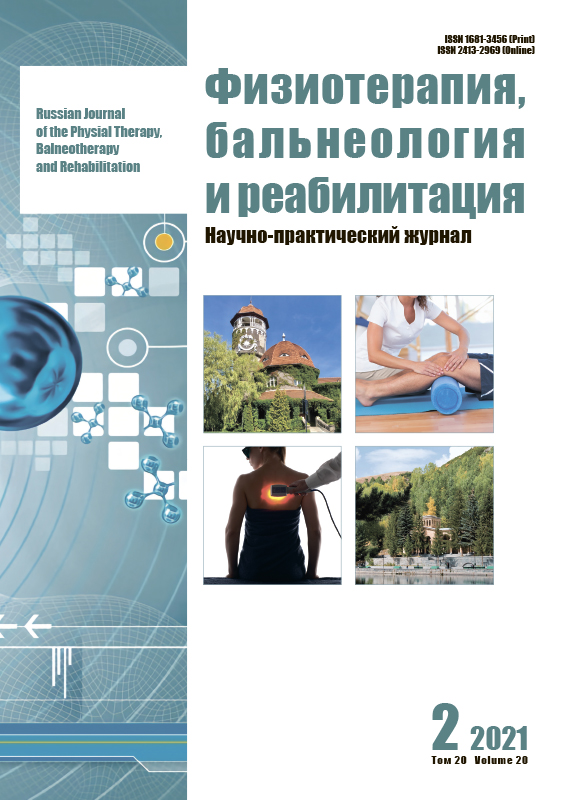Аpplication of rehabilitation technologies to improve cognitive functions in patients with ischemic stroke
- Authors: Mikhailova A.A.1, Korchazhkina N.B.1, Koneva E.S.2, Kotenko K.V.1
-
Affiliations:
- Petrovsky National Research Centre of Surgery
- The First Sechenov Moscow State Medical University (Sechenov University)
- Issue: Vol 20, No 2 (2021)
- Pages: 155-160
- Section: Original studies
- Published: 15.03.2021
- URL: https://rjpbr.com/1681-3456/article/view/90009
- DOI: https://doi.org/10.17816/1681-3456-2021-20-2-7
- ID: 90009
Cite item
Abstract
BACKGROUND: Currently, the development and implementation of new effective comprehensive programs for medical rehabilitation of patients who have undergone acute cerebrovascular accident is an important and urgent medical problem.
AIMS: To study the effect of combined methods of medical rehabilitation in patients with post-stroke spasticity on cognitive functions and psychoemotional status.
MATERIAL AND METHODS: The study involved 60 patients who underwent ischemic stroke with movement disorders in the form of hemiparesis with increased muscle tone in the form of spasticity in the long-term period. Patients of the control group (30 people) underwent standard drug therapy and medical rehabilitation, patients of the main group (30 people), against the background of standard drug therapy and medical rehabilitation, used combined physiotherapy methods from the Alpha™ LED Oxy Light Spa™ apparatus. Subjective indicators of cognitive impairment (Montreal Cognitive Assessment Scale) and psychoemotional defects (Hospital Anxiety and Depression Scale) were assessed.
RESULTS: Immediately after treatment on day 14, cognitive functions significantly improved and the degree of psychoemotional defect decreased, which was confirmed by the MOCA and HADS scales.
CONCLUSION: The inclusion of combined physiotherapy methods in the standard complex of medical rehabilitation and treatment of patients after ischemic stroke with movement disorders in the form of hemiparesis contributes to a significant improvement in cognitive functions and a decrease in the degree of psychoemotional impairment.
Full Text
About the authors
Anna A. Mikhailova
Petrovsky National Research Centre of Surgery
Author for correspondence.
Email: mikhaylova003@gmail.com
ORCID iD: 0000-0002-4260-1619
SPIN-code: 7673-3241
MD, Cand. Sci. (Med.), Associate Professor
Russian Federation, MoscowNatalya B. Korchazhkina
Petrovsky National Research Centre of Surgery
Email: mikhaylova003@gmail.com
ORCID iD: 0000-0001-6913-8778
SPIN-code: 9733-7646
MD, Dr. Sci. (Med.), Professor
Russian Federation, MoscowElizaveta S. Koneva
The First Sechenov Moscow State Medical University (Sechenov University)
Email: mikhaylova003@gmail.com
ORCID iD: 0000-0002-9859-194X
SPIN-code: 8200-2155
MD, Dr. Sci. (Med.), Professor
Russian Federation, MoscowKonstantin V. Kotenko
Petrovsky National Research Centre of Surgery
Email: mikhaylova003@gmail.com
ORCID iD: 0000-0002-6147-5574
SPIN-code: 5993-3323
MD, Dr. Sci. (Med.), Professor, Corresponding Member of the Russian Academy of Sciences
Russian Federation, MoscowReferences
- Walker MF, Hoffmann TC, Brady MC, et al. Improving the development, monitoring and reporting of stroke rehabilitation research: Consensus-based core recommendations from the Stroke Recovery and Rehabilitation Roundtable. Int J Stroke. 2017;12(5):472–479. doi: 10.1177/1747493017711815
- Liao XL, Zuo LJ, Zhang N, et al. The occurrence and longitudinal changes of cognitive impairment after acute ischemic stroke. Neuropsychiatr Dis Treat. 2020;16:807–814. doi: 10.2147/NDT.S234544
- Zakharov VV, Vakhnina NV, Gromova DO, Tarapovskaya AA. Diagnosis and treatment of cognitive impairment after stroke. Meditsinskii sovet. 2015;(10):14–20. (In Russ).
- Vakhnina NV. Modern therapy of cognitive disorders. Nevrologiya, neiropsikhiatriya, psikhosomatika. 2011;(4):63–69. (In Russ).
- Kotenko KV, Epifanov VA, Epifanov AV, Korchazhkina NB. Rehabilitation for diseases and injuries of the nervous system. Moscow: GEOTAR-Media; 2016. 656 р. (In Russ).
- Koneva ES. Comparative assessment of the effectiveness of rehabilitation programs in patients with spasticity syndrome [dissertation abstract]. Moscow; 2011. 194 p. (In Russ).
- Epifanov AV, Achkasov EE, Epifanov VA, Medical rehabilitation. Moscow: GEOTAR-Media; 2019. 727 р. (In Russ).
- Koneva ES, Shapovalenko TV, Lyadov KV, et al. The effectiveness of the inclusion of spatially oriented movement therapy in complex rehabilitation programs for patients with spastic hemiparesis after stroke. Physiotherapist. 2020;(2):14–19. (In Russ). doi: 10.33920/med-14-2004-02
Supplementary files








